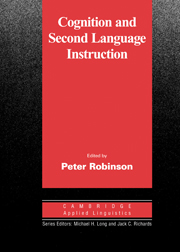Book contents
- Frontmatter
- Contents
- Series editors' preface
- Preface
- SECTION I THEORETICAL ISSUES
- 1 Attention
- 2 Memory for language
- 3 The competition model: the input, the context, and the brain
- 4 Sentence processing
- 5 Automaticity and automatization
- 6 Learnability and second language acquisition theory
- SECTION II COGNITION AND INSTRUCTION
- References
- Index
4 - Sentence processing
Published online by Cambridge University Press: 05 October 2012
- Frontmatter
- Contents
- Series editors' preface
- Preface
- SECTION I THEORETICAL ISSUES
- 1 Attention
- 2 Memory for language
- 3 The competition model: the input, the context, and the brain
- 4 Sentence processing
- 5 Automaticity and automatization
- 6 Learnability and second language acquisition theory
- SECTION II COGNITION AND INSTRUCTION
- References
- Index
Summary
Introduction Sentence processing research seeks to understand the processes responsible for the comprehension and production of sentences in real time. Second language (L2) processing research complements that devoted to understanding language structure, in which the focus is on describing the phonological, lexical, and syntactic knowledge in the L2. It also complements investigations of language function, in which the interest is in how language is used in communicative contexts. Processing research differs from research on language structure and function in that it is primarily concerned with understanding the mental processes responsible for language as a dynamic, real-time entity. All three components are essential elements in a complete theory of second language acquisition (SLA).
Research on sentence level processing is a central focus in psycholinguistics, computational linguistics and artificial intelligence (Clifton, Frazier, & Rayner, 1994). Of central concern is how the different sources of linguistic and extralinguistic knowledge interact in real time to yield meaning. Like all cognition, the processes involved in sentence comprehension are only indirectly available to examination, and unfold on a millisecond timescale. This presents a great challenge to researchers in the field, as both theoretical and technical issues must be adequately addressed if progress is to be made. The insights derived from this research afford an important window both into the workings of the human speech processing mechanism and into the organization of the mind and behaviour (Carpenter, Miyake, & Just, 1995).
Information
- Type
- Chapter
- Information
- Cognition and Second Language Instruction , pp. 91 - 124Publisher: Cambridge University PressPrint publication year: 2001
Accessibility standard: Unknown
Why this information is here
This section outlines the accessibility features of this content - including support for screen readers, full keyboard navigation and high-contrast display options. This may not be relevant for you.Accessibility Information
- 26
- Cited by
